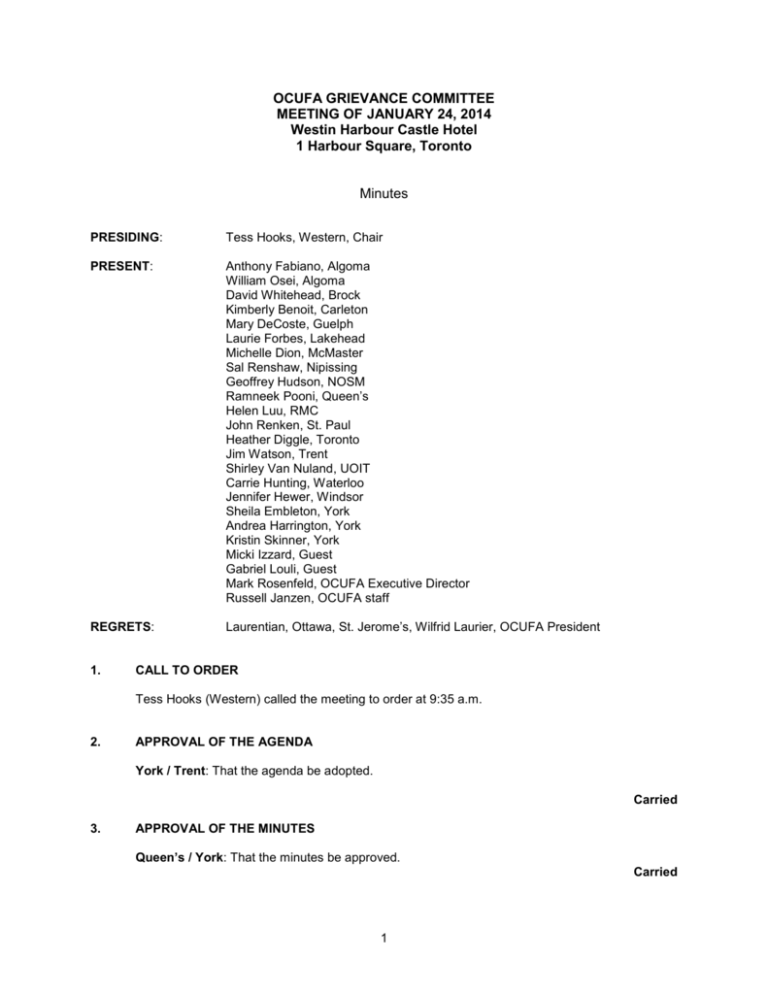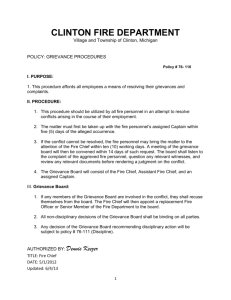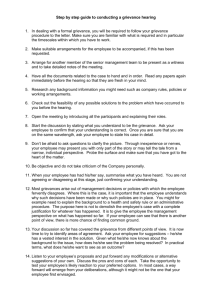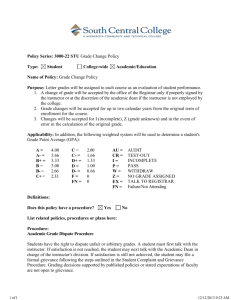OCUFA GRIEVANCE COMMITTEE
advertisement

OCUFA GRIEVANCE COMMITTEE MEETING OF JANUARY 24, 2014 Westin Harbour Castle Hotel 1 Harbour Square, Toronto Minutes PRESIDING: Tess Hooks, Western, Chair PRESENT: Anthony Fabiano, Algoma William Osei, Algoma David Whitehead, Brock Kimberly Benoit, Carleton Mary DeCoste, Guelph Laurie Forbes, Lakehead Michelle Dion, McMaster Sal Renshaw, Nipissing Geoffrey Hudson, NOSM Ramneek Pooni, Queen’s Helen Luu, RMC John Renken, St. Paul Heather Diggle, Toronto Jim Watson, Trent Shirley Van Nuland, UOIT Carrie Hunting, Waterloo Jennifer Hewer, Windsor Sheila Embleton, York Andrea Harrington, York Kristin Skinner, York Micki Izzard, Guest Gabriel Louli, Guest Mark Rosenfeld, OCUFA Executive Director Russell Janzen, OCUFA staff REGRETS: Laurentian, Ottawa, St. Jerome’s, Wilfrid Laurier, OCUFA President 1. CALL TO ORDER Tess Hooks (Western) called the meeting to order at 9:35 a.m. 2. APPROVAL OF THE AGENDA York / Trent: That the agenda be adopted. Carried 3. APPROVAL OF THE MINUTES Queen’s / York: That the minutes be approved. Carried 1 4. BUSINESS ARISING FROM THE MINUTES a) Equity and gender training/resources sub-committee: Tess reported that Sal Renshaw (Nipissing) and David Whitehead (Brock) are members; Karen Wheeler (OCUFA staff support for the OCUFA Status of Women Committee) will participate. They are meeting over lunch to discuss next steps, time permitting to present a report to the committee at the April 4 meeting. Mary DeCoste (Vice-Chair) agreed to participate. b) Lancaster House audio conferences: Russell Janzen (OCUFA staff) advised the committee that the Lancaster House audio conferences selected at the previous meeting had been purchased and would now be available in the Grievance Committee section of the Members Area of the OCUFA web-site. c) Workplace investigators ratings: Ramneek Pooni (Queen’s) reported that she and André Foucault (Ryerson) had discussed how to proceed and were of the opinion that there was too little data to proceed with a project of this nature at the moment. They suggest revisiting the idea in the fall. d) Processes and criteria for selecting independent medical examiners: Only two associations with experience in this area had responded to the question distributed by email. A copy of the summary was included in the meeting materials. e) Peer mediation processes: Due to weather delays, the matter was deferred until Sal Renshaw (Nipissing) was able to join the committee. When the item was taken up after item 6, Sal outlined the concept of peer mediation she had in mind for the committee to discuss. It would entail using association members with appropriate training and certification as mediators for disputes involving association members at another Ontario institution. The OCUFA Grievance Committee could facilitate the identification of a roster of mediators, and some resource commitment might be required to provide training. Mediators would be required to commit to several years. In the discussion, statements in favour of the idea cited cost savings to employers and faculty associations in light of the increased number of cases of workplace harassment being dealt with, employer-initiated processes are not serving association members well, and the preference for mediated settlements over legalistic and adversarial proceedings. Converse opinions expressed skepticism about the likelihood of employers’ acceptance of OCUFArecommended peer mediators, association members’ own confidence in the process, and a large number of established third party mediators. Tess proposed that the committee could revisit the matter at a future date if a formal proposal and assessment of resource requirements from OCUFA and the Grievance Committee were made. Sal advised the committee she was willing to receive any further information and suggestions they would be willing to offer. 5. REPORT OF OCUFA EXECUTIVE AND BOARD Mark Rosenfeld (OCUFA Executive Director) presented the report, a copy of which was provided in meeting materials. He discussed the upcoming provincial budget and the possibility of a general election in the spring. He outlined a number of initiatives undertaken by the provincial 2 government, including the differentiation policy framework, a proposed online centre of excellence, capital funding for satellite campuses, and the extension of the tuition grant. He gave an update on OCUFA’s activities with respect to Strategic Mandate Agreements, program prioritization, pensions, the OCUFA education and mobilization and We Teach Ontario campaigns, and the upcoming Future U conference. Discussion centred on the proposed online centre of excellence and its implications for faculty workload and intellectual property. 6. CASE MANAGEMENT AND GRIEVANCE DATABASES Micki Izzard of the University of Western Ontario Faculty Association and Gabriel Louli and Peter Douglas of LabourWare gave presentations on the purpose and design of grievance databases. Micki opened the session with a brief explanation of what databases are and the different parts and functions of databases. She identified several essential features, including ease of use, search functions, filtering options, email notification, file upload capacity, and list or spreadsheet report formats. For associations considering the purchase or development of a grievance database, she recommended they consider: a) whether it should be located on a desktop computer or online; b) the cost is one-time or monthly, per user or per member; c) administrator and user options (who has access and of what type); d) the scope of changes that can be made on contract renewal. She recommended they ask prospective contractors about: a) future costs; b) upgrades; c) the range and type of devices for access; d) file backup systems; e) types and levels of security. Gabriel and Peter discussed the advantages of having a grievance database and outlined some of the features of their own product. Among the advantages they identified were the ability to manage multiple and simple or complex timelines, standardized case language for consistent results, and better research and reporting using references and cross-references to language and clauses in agreements, etc. They also observed that it helps preserve institutional memory in organizations with elected leadership positions. They also discussed the features of their own product, including the level of detail it can accommodate with respect to clauses in agreements, variety of complaint or case types, management of supporting documents, and others. Copies of the presentations are to be made available in the Grievance Committee’s section of the Members Area of the OCUFA web-site. 7. MEMBERS’ DISCUSSION a) Member Reports Each member of the committee was invited to report on grievance issues on behalf of her or his association. The members raised the following issues: hiring practices; harassment; denial of research leave; academic misconduct; discipline; timeliness of employer responses; program prioritization; access to information requests; custody and control of documents; bargaining unit work; contract academic staff appointments; tenure denial; teaching stream appointments; workload; LTD and return to work; conflict of interest; religious accommodation; early retirement; unfair labour practice; medical information consent forms; sick leave; email access; wrongful dismissal; confidentiality; promotion and tenure; expense reimbursement. b) Trends and issues No trends or specific issues were identified for further discussion. 3 8. REPORT OF GRIEVANCE COMMITTEE CHAIR a) Discussion of future sessions: Members were reminded that Jesmen Mendoza (Ryerson) will be conducting a session on dealing with distressed members, and were asked to send suggestions for scenarios to Russell to forward to Jesmen. b) Notice of elections: Tess reminded members that a notice of election was included in the meeting materials, and advised them that one nomination for committee Chair had been received. c) Other matters Tess advised the committee that the proposed workshop on “After Bill 168: Occupational Health and Safety in the Academy” is postponed. She suggested the Grievance Officer Orientation Workshop might be held every second year and “After Bill 168” might be scheduled for 2015 instead of an orientation workshop. She proposed the committee discuss the matter at the next meeting. Tess also advised the committee that, in light of the postponement of “After Bill 168,” a labour studies student from McMaster University who is doing a placement at OCUFA is seeking two committee volunteers to be interviewed for approximately 45 minutes about “their experiences, familiarity, issues with violence in the workplace….” Russell will send an email reminder to recruit interview subjects. The next meeting is April 4, 2014. 9. OTHER BUSINESS Tess reminded members they can send any ideas for committee projects or meeting sessions to Russell any time between meetings as well. The meeting adjourned at 4:10 p.m. 4




